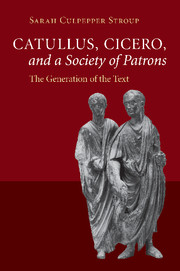Book contents
- Frontmatter
- Contents
- Preface and acknowledgments
- List of abbreviations
- Introduction
- I HOW TO WRITE ABOUT WRITING
- II THE TEXTUALIZATION OF DISPLAY
- 4 The problem with liberal performance
- 5 From public display to textual display
- 6 The poetics of literary obligation
- III THE MATERIALIZATION OF THE TEXT
- Epilogue
- Appendix: What “Society of Patrons”? A prosopography of the players
- Bibliography
- Index locorum
- Index rerum et nominum
6 - The poetics of literary obligation
Published online by Cambridge University Press: 04 August 2010
- Frontmatter
- Contents
- Preface and acknowledgments
- List of abbreviations
- Introduction
- I HOW TO WRITE ABOUT WRITING
- II THE TEXTUALIZATION OF DISPLAY
- 4 The problem with liberal performance
- 5 From public display to textual display
- 6 The poetics of literary obligation
- III THE MATERIALIZATION OF THE TEXT
- Epilogue
- Appendix: What “Society of Patrons”? A prosopography of the players
- Bibliography
- Index locorum
- Index rerum et nominum
Summary
OBLIGED TO SPEAK: WHY AN ORATOR CAN'T HELP HIMSELF
In order to impose a strong sense of obligation and reciprocity on his written political voice, Cicero needed to adapt the unwritten system of rules, duties, and presumptions of the forum into the new medium of the exchanged literary text. There is no perfect term to describe this system, this understanding of expected social performance in the forum and between recognized orators, but we might designate it as a kind of “forensic obligation.” It is forensic (as opposed to domestic, for instance, or martial) both in terms of geographical orientation – it is the obligation of the forum – and in terms of context – it is the principle that governs forensic practice. It is an obligation (as opposed to a habit or an expectation) because the actions required by this system were taken to be compulsory and binding (neither optional, nor a matter of preference); when an orator claims that he speaks only because he is under a forensic obligation to do so, he means that his voice is not passively expected – it is actively required.
It can pass without remark that Cicero and those with whom he habitually exchanges his texts were well conversant in the language and subtleties of forensic obligations; and indeed, this is the subject of many of Cicero's technica.
- Type
- Chapter
- Information
- Catullus, Cicero, and a Society of PatronsThe Generation of the Text, pp. 168 - 206Publisher: Cambridge University PressPrint publication year: 2010



